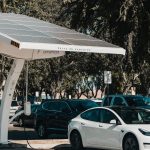Tesla is navigating the challenges posed by recent auto tariffs introduced by President Trump, as discussed during the company’s Q1 2025 earnings call. The electric vehicle manufacturer is taking proactive measures to mitigate the impact of these tariffs on its operations and profitability.
Companies with localized supply chains tend to manage trade restrictions more effectively. Tesla’s ongoing efforts to localize its supply chain, even prior to the imposition of these tariffs, give it an advantage over competitors dependent on imported parts.
How Will Trump’s Tariffs Affect Tesla’s Supply Chain?
The new tariffs are expected to disrupt the supply chains of American automakers.
“And so we are, I think, the least affected car company with respect to tariffs, at least in most respects. I mean, it remains to be seen. Now, tariffs are still tough on a company when margins are still low, but we do have localized supply chains in North America, Europe, and China. So that puts us in a stronger position than any of our competitors,” Elon Musk stated.
What Measures Has Tesla Taken to Localize Its Operations?
Tesla has been actively localizing its supply chain to enhance resilience against tariffs.
“This is in part is [from] all the work which the team has been doing over the years. And to the extent that today, you know, if you look at our vehicle lineup in [the] US, we’re about approximately on a weighted average basis, 85% USMCA compliant,”
said CFO Vaibhav Taneja.
How Prepared Is Tesla to Maintain Profitability Amid Tariffs?
Tesla remains confident in managing tariff-induced challenges due to its strategic localization. The company’s compliance with USMCA across 85% of its vehicle lineup in the US underscores its preparedness to sustain profitability despite the new tariffs.
Tesla’s strategic approach to localization not only reduces vulnerability to tariffs but also strengthens its supply chain efficiency. This positions the company to better navigate economic shifts and maintain its competitive edge in the electric vehicle market.










